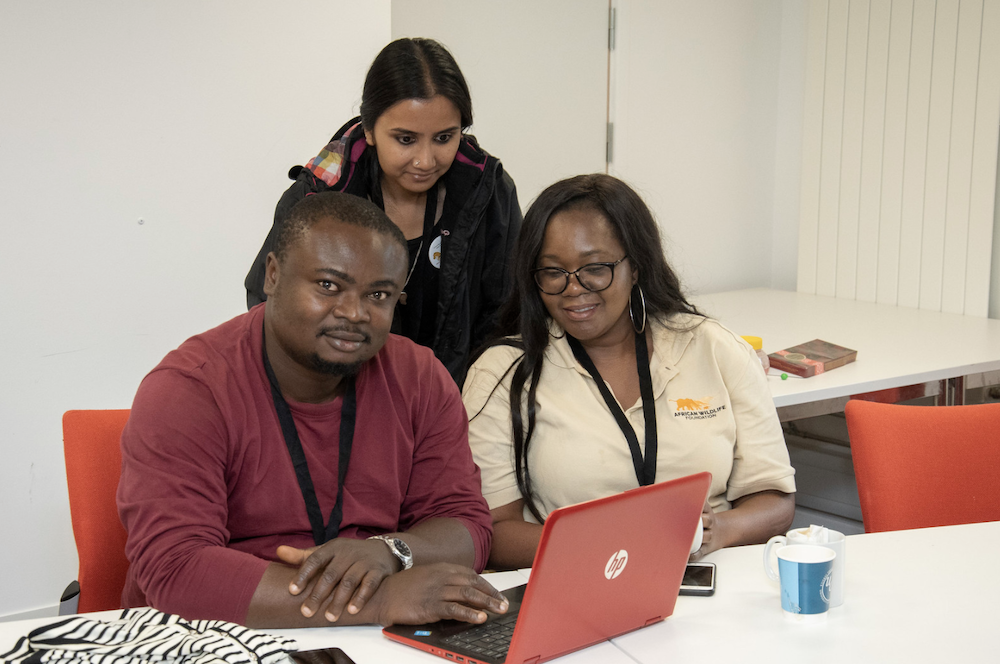
Visit the about section for an overview of the Masters’, and find full course details including how to apply here. Applications for the 2022-23 course are now open, closing on 2 December 2021. From 2022-23 the course content is being restructured.
Students come from a very diverse set of backgrounds and from all over the world. With around 20 joining the course each year, inter cohort bonds become very strong and this peer relationship this is seen as one of the most valuable outcomes. The Masters allows space at the very beginning of the course to build these relationships, and learn more about UK Conservation Leadership on our annual fieldtrip to the Norfolk broads
The course has two elements, taught modules and professional placements:
Taught modules
CL1 Conservation Leadership Problems and Practice
This module aims to explore the economic, social and biological context of biodiversity loss and conservation
CL2 Conservation Enterprise
This module aims to examine different forms of incentive-based conservation and review the costs and benefits of different types of conservation enterprise in terms of their economic, social and ecological values and contributions
CL3 Conservation Management
This module aims to give students the practical skills and strategies needed to manage conservation organisations and projects
CL4 Communicating Conservation
This module aims to help students explore different ways to communicate conservation and to identify the most appropriate forms of communication for different conservation contexts
CL5 Conservation Governance
This module aims to explore and critically assess the different forms of governance that are relevant to biodiversity conservation and understand the different actors that are involved in shaping decisions
CL6 Innovation for Conservation Leadership
This module aims to provide future conservation leaders with skills to manage, innovate and be entrepreneurial. It includes a group consultancy project, undertaken with one of the CCI partner organisations.
Professional placements
A central component of the Masters is the professional placement with an organisation engaged in conservation practice and/or research. Students work on a specific project which addresses a carefully defined conservation leadership challenge.
Examples of placement topics
- The role of conservation clusters in promoting and creating innovative conservation solutions (with the Judge Business School)
- Facilitating a strategic planning process for a new conservation fund in Mozambique (with FFI)
- Governance of marine protected areas: turning paper parks into effectively managed units (with FFI)
- What sells the conservation message? An analysis of negative and positive messages in communicating and fundraising for nature conservation (with the Department of Zoology)
- Exploring the applicability of WCMC's Biodiversity Knowledge Products to Agriculture (with UNEP-WCMC)
- Capacity building needs for the conservation and sustainable management of Cetaceans (with the International Whaling Commission)
Case Study: Brian Lainoff (2017-18)
During his professional placement, Brian Lainoff (2017-18) worked with Botanic Gardens Conservation International (BGCI) to find ways to motivate and empower botanic gardens across the world to ensure the conservation of plant diversity. Brian worked with over 30 botanic gardens to develop the BGCI Accreditation Scheme. BGCI’s Accreditation Scheme distinguishes botanic gardens from non-botanic gardens and recognises achievements in plant conservation. Since the placement, Brian stayed on at BGCI as the Head of Membership Strategy and Services and continued to implement the accreditation scheme. Brian’s placement developed and implemented a program that has been completed by more than 50 botanic gardens across the globe and counting. Recently Cambridge University Botanic Garden was awarded the status of a BGCI Accredited Botanic Garden. Read more
Covid-19
Due to the effects of the Covid-19 pandemic and government guidance, we have had to make some changes to the delivery, but not the content, of the programme in order to mitigate against risks to health and to give students the best possible academic experience in the circumstances. We will continue to monitor and respond to the changing public health situation. At present, we expect to deliver the great majority of teaching and supervision in-person, with appropriate distancing and safety guidelines in place. The specific changes that might be necessary are (1) some teaching may need to be delivered remotely or online, resulting in a hybrid online and in-person teaching model, and (2) we may not be able to include a residential fieldtrip, in which case we would make plans for a local alternative fieldtrip close to Cambridge. We hope to be able to run the professional placement in person, but it may be necessary for these to be conducted remotely if partner organisation offices are closed. We will keep offer-holders and students fully informed of the full details of these changes as soon as they are available.
